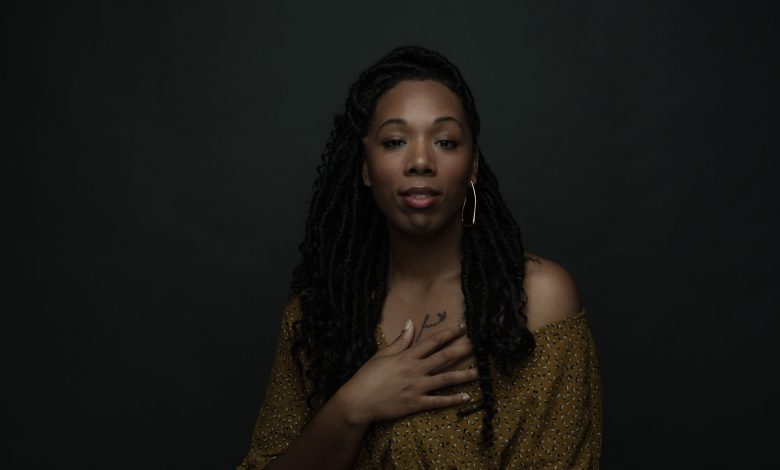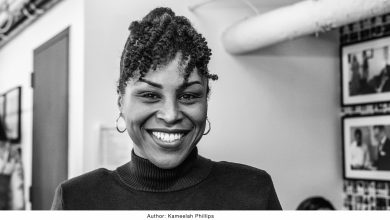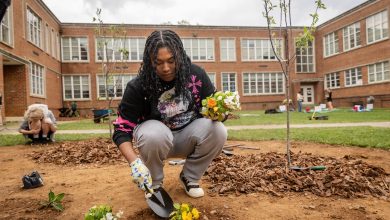Ashley-Lauren Elrod on Mental Health and Empowerment


What used to be a taboo issue in the Black community is now discussed more openly. Mental health significantly impacts Black Americans.
In fact, Black people living below the poverty level are twice as likely to report serious psychological distress compared to those living above the poverty level, according to a recent report from the U.S. Department of Health and Human Services.
October is recognized as National Depression and Mental Health Screening Month with awareness events across the nation.
Born in Chicago, Ashley-Lauren Elrod wears many hats as an actress and entrepreneur who founded the production company Visionary Woman Productions, which was nominated for an Emmy.
What she’s doing behind the scenes to raise awareness of mental health is inspiring people worldwide. Elrod says she’s partnered with organizations “to raise awareness, challenge legislation, and tell powerful stories that need to be told.”
She bravely uses her personal journey, marked by childhood sexual abuse, PTSD, and depression, to uplift other Black women and others who may have had similar experiences.
Elrod’s journey from the depths of despair—including a near-suicide attempt—has shaped her into an advocate determined to break generational cycles of trauma.
Elrod sat down with Blackdoctor.org to share her riveting story, and information about her upcoming film project, and talk more about the time when she almost took her own life. The interview has been slightly edited for brevity and clarity.
You’ve mentioned a near-suicide attempt that redefined your life. Can you tell us about that pivotal moment and what ultimately saved you? How has that experience influenced your work and advocacy?
That moment was a defining one in my life—I actually went through with the suicide attempt, overwhelmed by the trauma of childhood abuse that led to a multitude of other traumas in my adulthood. It started as depression that slowly went into the dark hole of suicide ideation over the course of a year, which brought me to a hollow place I wish never to see again. Due to the grace of God, my friend found me just in time and saved my life. It was that moment that gave me a second chance to be here today, sharing my story with others.
This experience has deeply influenced everything I do. It pushed me to not only heal myself but to become an advocate for others, especially survivors of child abuse and sex trafficking. As a mental health coach, speaker, and advocate for organizations like the Chicago Children’s Advocacy Center and the National Children’s Alliance, my focus has been to provide a voice for those who may feel silenced by their trauma. My work with Humans For Justice, Thistle Farms, and Dove’s Kids Online Safety Act campaign reflects that second chance—to spread awareness, educate, and give hope to those who are struggling.
The attempted suicide didn’t end my story; it transformed it. It has fueled my passion for mental health, helping to co-create programs like the Gateway mental health coaching initiative at Elevation Church during COVID-19, and shaping my production company, where I tell stories with purpose, like my upcoming film Verge of Remembrance. Additionally, this journey has inspired me to write my autobiography, The Diary of a Recovering Inner Child, exploring my healing process and reclaiming my identity. I’m also returning to school to earn my Master’s degree and receive my counseling license so that I can offer even more support to those navigating their healing journeys.
Everything I do, whether in film, advocacy, or coaching, is to show that healing is possible and that, even when we feel broken, we are capable of finding strength and redemption.

You have an upcoming film, “Verge of Remembrance.” Can you give us a sneak peek into the project and information about where people can find it?
Absolutely! Verge of Remembrance is an intense psychological thriller that delves into the haunting journey of trauma survivors as they navigate the fine line between memory and reality. The film explores the impact of abuse and PTSD, bringing to light the complex emotions and struggles faced by those dealing with past traumas.
This project is deeply personal, as it’s based on real themes from my own life, navigating childhood trauma and PTSD as an adult. It also explores how intergenerational trauma can ripple through one’s life and affect everyone around them. One of the central characters, Kayla, embodies this complexity as her traumatic past intertwines with the protagonist’s journey, offering an emotional portrayal of healing and resilience.
We’re proud to share that this film will support Project CAN HOPE, an initiative in collaboration with the Chicago Children’s Advocacy Center (Chicago CAC). This project provides direct services, mental health resources, and education for children and families affected by abuse.
We’re still in the production stage, but you can follow our journey to stay updated on release details and support the project as a sponsor by visiting our website www.visionarywomanproductions.com.
Stay tuned for exclusive previews, behind-the-scenes content, and release announcements on all of our social media pages!
Can you share how your early experiences shaped your path and what motivated you to start Visionary Woman Productions?
My early experiences, particularly the trauma of childhood abuse, profoundly shaped my path and fueled my desire to create a positive impact in the world. Growing up in such a challenging environment left me with deep emotional scars, but it also ignited a determination to reclaim my narrative. This journey of healing and recovery has been central to my life, leading me to become an advocate for survivors of abuse and sex trafficking.
These experiences motivated me to start Visionary Woman Productions, which began as a collective with friends who shared a passion for storytelling. It transformed into much more during my senior year of college, as I recognized the power of media to effect change and inspire others. I wanted to create a platform that not only entertains but also educates and empowers individuals to find their voice and pursue healing. The mission of my production company aligns with my work as a mental health coach and advocate for organizations like the Chicago Children’s Advocacy Center and the National Children’s Alliance, where I strive to amplify the voices of those who have been silenced by trauma.
Ultimately, my early experiences have not only shaped my path but have also instilled in me a deep passion for advocacy and a desire to empower others. By sharing my story and those of others through Visionary Woman Productions, I hope to inspire change, spread awareness, and provide a sense of hope to those navigating their own healing journeys.
Faith and spirituality play a significant role in your healing process. How did they help you navigate through your darkest moments, and what advice would you give to others seeking solace in their faith?
Faith and spirituality have been pivotal in my healing journey, providing me with strength and a sense of purpose during my darkest moments. When I felt overwhelmed by the pain of my past and the weight of trauma, my faith acted as a lifeline. It offered me a framework to make sense of my experiences and a community that supported me in my healing.
In those times of despair, prayer, and reflection allowed me to connect with something greater than myself, reminding me that I wasn’t alone in my struggles. Spiritual practices helped me cultivate inner peace and resilience, guiding me to focus on hope rather than despair. It was in those moments of vulnerability that I found clarity about my purpose and a desire to turn my pain into advocacy for others who are suffering.
God is greater and goes beyond organized religion. In my personal deconstruction journey, I’ve come to realize this, and my groundedness with God and my faith has reached another level. This deeper connection continues to fuel my healing journey and helps me support others in their struggles.
For anyone seeking solace in their faith, my advice would be to lean into that relationship with openness and honesty. Allow yourself to express your doubts, fears, and pain. Don’t shy away from the difficult questions, as they can lead to deeper understanding and growth. Surround yourself with a supportive community that uplifts and encourages you. Engage in practices that resonate with you—be it prayer, meditation, or service to others—as these can cultivate a sense of peace and connection.
Remember, healing is a journey, and it’s okay to take it one step at a time. Faith can be a powerful source of hope and transformation, helping you navigate even the darkest valleys. Trust in the process and allow your faith to guide you toward healing, strength, and the ability to support others on their paths.

Breaking away from generational trauma is not always easy. What lessons have you learned from your experiences that could help to inspire others on similar paths? And do you feel that healing is an ongoing journey?
Breaking away from generational trauma is indeed a challenging process, but it can also be profoundly transformative. My experiences have taught me several valuable lessons that I hope can inspire others on similar paths:
- Acknowledge the Pain: It’s essential to recognize and validate your feelings and experiences. Acknowledging the pain is the first step toward healing. It’s okay to feel hurt, and it’s okay to seek help to navigate through those feelings.
- Seek Support: You don’t have to go through this journey alone. Surrounding yourself with a supportive community—whether friends, family, or professionals—can provide encouragement and understanding. Finding others who share similar experiences can be particularly healing.
- Redefine Your Narrative: Understand that you have the power to change your story. Just because certain patterns have existed in your family doesn’t mean they have to continue with you. Embrace your individuality and rewrite your narrative by making conscious choices that promote healing and growth.
- Practice Self-Compassion: Healing takes time, and it’s crucial to be kind to yourself throughout the process. Celebrate your progress, no matter how small, and forgive yourself for any setbacks. Remember, healing is not linear.
- Establish Healthy Boundaries: Learning to set boundaries with family members or environments that perpetuate trauma is vital. Protecting your mental and emotional well-being is a form of self-love and respect.
- Embrace Change: Change can be uncomfortable, but it’s necessary for growth. Embracing new ways of thinking and living can help break the cycle of trauma and foster a healthier mindset.
- Stay Open to Healing: Healing is an ongoing journey, not a destination. It requires continuous self-reflection, learning, and growth. As we evolve, new layers of healing may emerge, and that’s a natural part of the process.
Yes, I absolutely believe that healing is an ongoing journey. While there are pivotal moments of breakthrough, where clarity, peace, or newfound strength might emerge, healing is rarely a straightforward path. Just as life evolves, so does our healing process. There may be moments when you feel like you’ve made significant progress, only for old wounds or memories to resurface unexpectedly. This can sometimes feel disheartening, but it’s a natural part of the journey. Healing doesn’t mean that pain or trauma completely disappears; rather, it’s about learning how to manage and navigate those difficult emotions in healthier ways as they arise.
It’s essential to approach these moments with patience and compassion. When old wounds resurface, it’s not a sign that you’ve failed or that you haven’t healed enough—it’s simply a reflection of how deeply ingrained some of these traumas might be. Healing is layered, and different experiences or stages of life can bring up emotions you thought were resolved. Instead of seeing setbacks as regression, it’s helpful to recognize that every challenge is an opportunity for deeper growth. Each time you face these emotions, you gain new tools, insights, and resilience, allowing you to approach the pain differently than before.
The idea that healing doesn’t have a fixed endpoint is liberating because it allows you to let go of the pressure to “be healed” or “be over it.” It’s an acknowledgment that healing is fluid, much like life itself. It ebbs and flows, and as you continue to grow, so does your capacity to heal. Every step you take, whether forward or backward, contributes to your overall growth and resilience. Even in the moments that feel like setbacks, you are still learning, still evolving, and still moving forward in your journey.
This perspective fosters a sense of grace and acceptance toward yourself. Healing becomes less about reaching a final destination and more about embracing the ongoing process, with all its highs and lows. It empowers you to continue seeking peace and wholeness, not by avoiding the pain, but by learning to live with it in a way that honors your journey and allows you to thrive.




